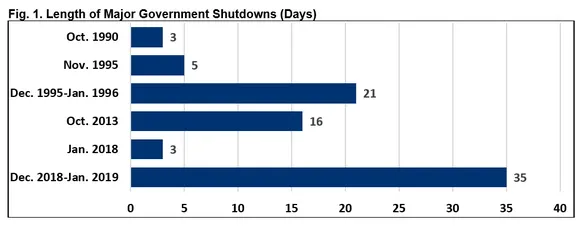Prevent Government Shutdowns Act of 2023 Introduced in the Senate
Last week, Senators James Lankford (R-OK), Maggie Hassan (D-NH), and a bipartisan group of nine additional senators reintroduced the Prevent Government Shutdowns Act of 2023 (PGSA). The bill would authorize an automatic continuing resolution (auto-CR) at current spending levels until lawmakers can reach an agreement on appropriations and create other incentives for the timely completion of appropriations work. This or a similar auto-CR would represent a significant improvement to the current federal budget process and help support healthy appropriations negotiations without the risks and costs associated with a government shutdown.
The Committee for a Responsible Federal Budget has previously proposed the introduction of an auto-CR and written favorably of several versions of the proposal, including prior drafts of the PGSA from Senators Lankford and Hassan. Below is an update to our 2021 piece on the 2021 version of the PGSA.
There have been twenty funding gaps during the modern budget era, the most recent being the 2018-2019 shutdown and the brief January 2018 shutdown. The public feels the effects of government shutdowns in a variety of ways without this automatic funding: Social Security and Medicare benefit verifications and card issuances cease, Environmental Protection Agency and Food and Drug Administration inspections are delayed, and Transportation Security Administration agents and air traffic controllers go unpaid, which has put a strain on air travel during previous shutdowns.

Source: "Better Budget Process Initiative: Automatic CRs Can Improve the Appropriations Process."
Government shutdowns also come with permanent fiscal and economic costs despite the temporary loss of services. The Congressional Budget Office (CBO) estimated that the 2018-2019 shutdown resulted in an unrecoverable $3 billion loss to the economy and that the last three shutdowns collectively have cost taxpayers nearly $4 billion.
The PGSA addresses government shutdowns by automatically extending appropriations at current funding levels for two weeks at a time, preventing funding gaps and ensuring all government services are still able to operate even if lawmakers reach an impasse. It also creates incentives to prevent appropriation lapses altogether. The bill would prioritize appropriations work in Congress by prohibiting all other matters besides general appropriations measures from being considered while an auto-CR is in effect, which could only be waived by a two-thirds vote for a period of no more than seven days.
Official travel would be prohibited for Members of Congress – including their personal staff and Committee staff, as well as White House budget staff – if the October 1 appropriations deadline is not met, while taxpayer-funded travel allowances and other travel reimbursements would be cut off and daily mandatory quorum calls would be required. Senate nominations and certain program authorization legislation could only be considered after a period of 30 days.
Previously, the Prevent Government Shutdowns Act of 2020 was reported favorably by the Senate Committee on Homeland Security and Governmental Affairs by a vote of 10-2 (the two members voting "no" each had their own auto-CR bill). A similar measure introduced in 2021 did not advance after its introduction.
Objections to auto-CRs center on the perceived lack of motivation to enact appropriations under such a process, as well as the undermining of the Congressional power of the purse and one of the major sources of leverage that lawmakers have. We have previously argued that auto-CRs reduce high-stakes brinkmanship to create space for holistic budgeting and provide incentives to complete a proper appropriations process, noting that states with auto-CR laws are just as likely to pass budgets on time as shutdown states. In addition, we have previously estimated the PGSA would have little-to-no negative fiscal impact, as any scored increase in mandatory spending would be offset by an equal reduction under discretionary spending.
In 2020, we identified at least 10 different proposals for auto-CRs, which are discussed in more detail in our Better Budget Process Initiative paper. A bipartisan range of auto-CR proposals includes legislation that would continue to fund programs at levels close to the prior appropriated amount but vary on spending rates and incentives to appropriate. Most importantly, they would forestall the unnecessary costs of government shutdowns.
The PGSA would strengthen the budget process by encouraging the timely passage of appropriations legislation and mitigating the harmful effects of government shutdowns. Maya MacGuineas, president of the Committee for a Responsible Federal Budget, praised the introduction of the Prevent Government Shutdowns Act of 2023:
Government shutdowns are unnecessary and preventable. Failing to accomplish the most basic task of governing harms our economic growth, interrupts government services, and furloughs many government employees caught in the middle. Implementing an automatic continuing resolution -- while ensuring legislators continue working until the job of funding the government is complete -- is a wise strategy. I commend Senators Lankford (R-OK) and Hassan (D-NH) for introducing the Prevent Government Shutdowns Act. This bill is an excellent initial step towards reforming our nation's flawed budget process, allowing our lawmakers to focus on long-term solutions rather than forcing short-term emergencies.
Learn more about government shutdowns here.


